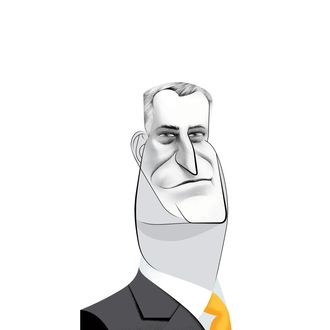
Bill de Blasio had stunned his Democratic rivals and won the party primary outright. Now, being cautious and superstitious, he was careful not to say anything that sounded like he was assuming victory in the general election. Yet he couldn’t completely deny reality. It was mid-October and within less than a month, De Blasio would be elected the next mayor of New York City. A certain gravity was already setting in. “I don’t think some switch went on. This process, over this year, has sort of been pulling me toward my goal, meaning I’m experiencing elements of my goal all along. So this thing sort of happens in stages,” he said as we drove away from his house in Park Slope. “But of course there’s another part of me that’s aware that life is changing now, and life could be changing a lot more soon.”
His job, and his life, changed officially when he was sworn in at 12:01 this morning. Large elements of De Blasio’s world have already shifted rapidly since he trounced Lhota on election day: Everything from the retailing of his daughter’s drug and alcohol problems to the choice to move to Gracie Mansion to the wildly escalated stakes of hiring staff to run a city instead of the public advocate’s office. No wonder De Blasio has complained to a friend of the increased pressure.
Yet the most fascinating thing, so far, is what hasn’t changed about De Blasio’s political stance. Most candidates win and tack toward the middle before taking office — partly because they’ll be governing citizens who didn’t vote for them as well as the ones who did, but mostly out of a calculated need to create some wiggle room in case they can’t deliver on all their lofty campaign promises. De Blasio has done the opposite: He’s become more definitive since November 5. Standing in the national spotlight after a meeting at the White House with President Obama two weeks ago, De Blasio declared income inequality “fundamentally unacceptable.” Raising taxes on the wealthy to pay for expanded pre-k and after-school programs? “It will be the centerpiece of our government.” Homelessness? “We’re not going to let down Dasani or any young woman or any young man like her.” Central Park carriage horse rides? “It’s over.”
Sure, in picking his new administration De Blasio has reinforced his reputation for being slow to make decisions, and he has been less ideological than his lefty supporters hoped, but neither is surprising: Even though De Blasio says he wants to overhaul stop-and-frisk he was never going to appoint, say, Charles Barron to run the NYPD. On most core issues, though, De Blasio has ramped up his rhetoric and backed up the words with hardball tactics. Despite all that stuff he said last year about why it’s bad for a city council speaker to be too close to a mayor, De Blasio has lobbied hard to line up votes for an ally, Melissa Mark-Viverito, to maximize his chances of passing progressive legislation next year.
De Blasio’s all-in approach on key points is intellectually admirable. But it’s politically risky: He owns these issues more than ever. If Mark-Viverito’s coalition crumbles next week, or the tax increase stalls, or Long Island College Hospital keeps hemorrhaging millions, De Blasio can’t dodge the fallout. Some of his moves so far are simply smart poker-playing, seizing the momentum from a landslide win while he can. But maybe it’s more than canny strategizing. When I asked De Blasio whether he will be the kind of mayor who shows up at a fire at 3 a.m., he didn’t hesitate. “I would say I’m gonna be very hands-on,” he said. “Not necessarily in every situation, but there might be some situations, certain emergencies, that it would be pivotal to be there for. I don’t mean to take the question too literally. I think my template is, activist, hands-on, lead from the front.” As of today, Bill de Blasio starts finding out how exciting a spot that really is.





























